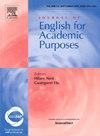A systematic analysis of first-person identity roles in agricultural sciences
IF 3.4
1区 文学
Q1 EDUCATION & EDUCATIONAL RESEARCH
引用次数: 0
Abstract
This paper presents a systematic quantitative and qualitative analysis of first-person reference in a corpus of 30 Agricultural Science research articles. The analysis is based on Tang and John’s (1999) taxonomy of authorial identity roles cross-referenced with rhetorical functions within the IMRaD structure. A total of 795 instances (39.3 per 10,000 words) were found, the most frequent roles being recounter (59.5 %) and opinion-holder (32.8 %) spread across all sections. The highest density, however, was observed in the short Conclusion section and Abstract (84.1 and 75.7 per 10k, respectively). Interestingly, the qualitative analysis revealed that instances of presenting reasoned decisions for procedural choices outnumbered plain description of procedures through first-person reference in Methods. These were also frequent in the Results section, where stating results with the first-person was relatively rare (21 of 62 tokens). In the Discussion section, use of the possessive was higher than that of the subject pronoun (52.2 % vs. 46 % instances), which was attributable to writers employing our to identify the source of the data under consideration in the control of the different voices in the text. The study provides new insights into the diverse ways that authors imprint their presence on their discourse through self-reference.
农业科学中第一人称身份角色的系统分析
本文对30篇农业科学研究论文语料库中的第一人称指称进行了系统的定量和定性分析。这一分析基于Tang和John(1999)的作者身份角色分类,该分类与IMRaD结构中的修辞功能相互参照。总共发现了795个实例(每10,000个单词中有39.3个),最常见的角色是重述者(59.5%)和意见持有人(32.8%),分布在所有部分。然而,在较短的结论部分和摘要中观察到的密度最高(分别为84.1和75.7 / 10k)。有趣的是,定性分析显示,在方法中,通过第一人称引用对程序选择进行合理决策的实例多于对程序的简单描述。这些在Results部分中也很常见,其中用第一人称陈述结果的情况相对较少(62个标记中有21个)。在讨论部分,所有格的使用高于主语代词的使用(52.2% vs. 46%),这是由于作者在控制文本中不同的语态时使用our来识别所考虑的数据的来源。该研究为作者通过自我参照将自己的存在烙印在话语中的各种方式提供了新的见解。
本文章由计算机程序翻译,如有差异,请以英文原文为准。
求助全文
约1分钟内获得全文
求助全文
来源期刊

Journal of English for Academic Purposes
Multiple-
CiteScore
6.60
自引率
13.30%
发文量
81
审稿时长
57 days
期刊介绍:
The Journal of English for Academic Purposes provides a forum for the dissemination of information and views which enables practitioners of and researchers in EAP to keep current with developments in their field and to contribute to its continued updating. JEAP publishes articles, book reviews, conference reports, and academic exchanges in the linguistic, sociolinguistic and psycholinguistic description of English as it occurs in the contexts of academic study and scholarly exchange itself.
 求助内容:
求助内容: 应助结果提醒方式:
应助结果提醒方式:


